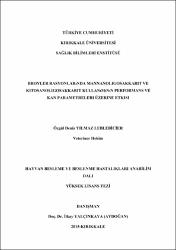| dc.contributor.advisor | Aydoğan, İlkay | |
| dc.contributor.author | Leblebicier, Özgül Deniz Yılmaz | |
| dc.date.accessioned | 2021-01-16T19:03:53Z | |
| dc.date.available | 2021-01-16T19:03:53Z | |
| dc.date.issued | 2015 | |
| dc.identifier.uri | | |
| dc.identifier.uri | https://hdl.handle.net/20.500.12587/15864 | |
| dc.description | YÖK Tez ID: 415019 | en_US |
| dc.description.abstract | Bu çalışma; rasyonda prebiotiklerden Mannanoligosakkarit ve kitosanoligosakkarit kullanımının broylerlerde canlı ağırlık (CA), canlı ağırlık artşı (CAA), yem tüketimi (YT), yemden yararlanma oranı (YYO), karkas randımanı, relative iç organ ağırlıkları ve kan parametreleri üzerine etkilerini incelemek amacıyla yapılmıştır. Araştırmada hayvan materyali olarak 120 adet Ross PM3 erkek etlik civciv kullanılmıştır. Araştırmada kullanılan rasyonlar, 1-14. günler arası etlik civciv yemi, 15-42. günler arası etlik piliç yemi ile beslenmiştir. Araştırma her bir grup 40 hayvandan oluşacak şekilde 3 gruba ayrılmış ve her bir grubun 4 alt grubu olacak şekilde düzenlemiştir. Kontrol grubuna Mannanoligosakkarit (MOS) ve Kitosanoligosakkarit (KOS) ilavesi yapılmamıştır. Araştırma grupları I. Grup kontrol grubu, II. Grup MOS 100 ppm; III. Grup KOS 100 ppm olacak şekilde düzenlenmiştir. Deneme 42 gün sürmüştür. Civcivler 0, 7, 14, 21, 28, 35 ve 42. günlerde tek tek tartılmıştır. Araştırma sonunda ortalama canlı ağırlıklar kontrol ve deneme gruplarında sırasıyla 2340.45; 2458.11 ve 2325.38 g olarak bulunmuştur. MOS verilen grupta ortalama canlı ağırlık, kontrol grubundan rakamsal olarak % 5.03 oranında daha yüksek bulunmuştur. Araştırma süresince (0-6 hafta) yemden yararlanma oranı sırasıyla 1.72; 1.65 ve 1.72 kg olarak saptanmıştır. Gruplar arasında istatistiki farklılık gözlenmemiştir (P>0.05). Deneme sonunda, CA, CAA, YT, YYO, karkas randımanı, relatif iç organ ağırlıkları, kan serum total protein, albümin, total kolestrol, trigliserid ve glikoz değerleri MOS ve KOS ilavesinden etkilenmemiştir (P>0.05). Plazma Cu düzeyi, kontrol grubuyla karşılaştırıldığında MOS ve KOS katılan grupta en yüksek bulunmuştur (P<0.05). Prebiyotiklerin performans üzerine etkileri yıllardır çalışılmaktadır. Bu çalışmada, deneme sonunda, MOS ve KOS ilavesinin performans üzerine olumlu bir etkisi görülmemiştir. Bu durum kullanılan doza ve çevresel faktörlere bağlanabilir. Bu nedenle etkin dozla ilgili daha ileri çalışmalara ihtiyaç duyulmaktadır. | en_US |
| dc.description.abstract | This study was conducted to investigate the effects of prebiotics, mannanoligosaccharide and chitosanoligosaccharide on body weight (BW), body weight gain (BWG), feed consumption (FC), feed consumption ratio (FCR), carcass yield, some relative organ weights and blood parameters. A total of 120, one day old Ross 308 male broiler chicks were used in this study. The chick were fed with starter (days 1-14) diet and grower (days 15-42) diet. Poults were assigned into three groups, with 4 replicates of 10 birds each. Treatment for each group consisted of: first group (control group) received basal diet without supplementation; second group received 100 ppm Mannanoligosaccharide (MOS); third group received 100 ppm Chitosanoligosaccharide (COS). The experiment lasted 42 days. The chickens were individually weighed at 0, 7, 14, 21, 28, 35 and 42 days. The end of experiment, the average body weights were measured as 2340.45; 2458.11 and 2325.38 g, respectively. Average body weights of chicks received MOS groups was numarically 5.03% higher than the control groups as numerically. During the experiment (0-6 weeks) FCR were determined as 1.72; 1.65 and 1.72 kg, respectively. There were no statically significant differences among trial groups (P>0.05). At the end of experiment, the supplementation of MOS and COS did not effect LWG, FC, carcass yield, relative organ weight, total protein, albümin, total cholesterol, trigliseride and glucose levels of the broilers among three trial groups (P>0.05). Compared with the control group, splasma Cu levels were highest in the group supplemented MOS and KOS (P<0.05). The effect of prebiotics on performance on broilers has been known well for years. In this study, at the end of experiment, the supplementation of MOS and KOS to the diet did not have a beneficial effect on performance. This results may be due to the dose of MOS and COS and envirmental factors used in this study. Therefore it is suggested to conduct progressive studies on this subject. | en_US |
| dc.language.iso | tur | en_US |
| dc.publisher | Kırıkkale Üniversitesi | en_US |
| dc.rights | info:eu-repo/semantics/openAccess | en_US |
| dc.subject | Veteriner Hekimliği | en_US |
| dc.subject | Veterinary Medicine | en_US |
| dc.subject | Bankacılık | en_US |
| dc.subject | | en_US |
| dc.subject | | en_US |
| dc.subject | | en_US |
| dc.subject | | en_US |
| dc.subject | | en_US |
| dc.subject | | en_US |
| dc.subject | | en_US |
| dc.subject | | en_US |
| dc.subject | | en_US |
| dc.subject | | en_US |
| dc.title | Broyler rasyonlarında mannanoligosakkarit ve kitosanoligosakkarit kullanımının performans ve kan parametreleri üzerine etkisi | en_US |
| dc.title.alternative | The effect of mannanoligosaccharide and chitosanoligosaccharide on performance and blood parameters in broiler rations | en_US |
| dc.type | masterThesis | en_US |
| dc.contributor.department | KKÜ, Sağlık Bilimleri Enstitüsü, Hayvan Besleme ve Beslenme Hastalıkları Anabilim Dalı | en_US |
| dc.identifier.startpage | 1 | en_US |
| dc.identifier.endpage | 52 | en_US |
| dc.relation.publicationcategory | Tez | en_US |
















